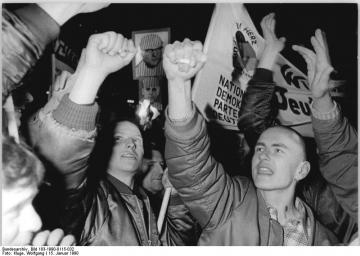Joint project
Project Management: Prof. Dr. Frank Bösch (ZZF Potsdam), Prof. Dr. Gideon Botsch (MMZ Potsdam)
Supported by the Volkswagen Foundation
The research project "The Radical Right in Germany, 1945-2000" examines the contemporary history of the radical right with previously untapped sources and socio-historical approaches. The project uses the term "radical right" to focus on actors who reject the core elements of the existing democratic constitutional order as a representative parliamentary democracy on the basis of a nationalist, authoritarian and racist worldview. This includes the smaller group of the violent extremist right, but is not identical with it. The project focuses on the overarching question of the social practices through which the generational transformation of the radical right in Germany took place - from the actors socialized under National Socialism to the cohort that grew up under democracy and the SED dictatorship and has set the tone since the 1970s.
The ZZF Potsdam is working on six sub-projects.
Currently, projects at the ZZF Potsdam are being worked on by: Laura Haßler, Dr. Marie Müller-Zetzsche, Darius Muschiol (completed phd project, June 2024), Dr. Dominiik Rigoll, Jakob Saß and Luisa Seydel (until 31.1.2023)
A short (german) description of the project "Die radikale Rechte in Deutschland, 1945-2000" can be found here (pdf)
To project website: https://projekt.radikale-rechte.de

